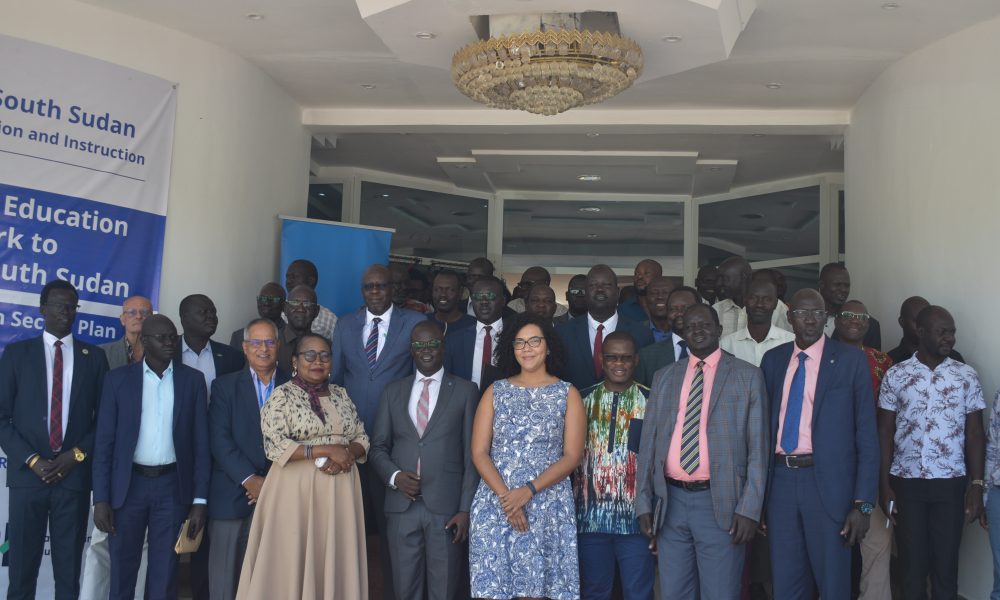By Gladys Fred Kole
Ministry of General Education and Instruction, in collaboration with its partners, validated the general education sector plan for the next five years.
This is the second education sector plan the United Nations Education Scientific and Cultural Organization (UNESCO) has organized in conjunction with the national education ministry.
The first general education plan was developed and incepted in 2017, which expired last year.
The Acting National Minister of General Education, Martin Tako Moi, speaking at the occasion, outlined some of the challenges in the education sector.
He stated that the number of schoolchildren dropping out of school keeps increasing instead of decreasing, from 2.2 in 2018 to more than 2.8 at present.
He underscored that the quality of teachers, coupled with the nature of the learning environment and the level of support from home, matter for quality learning outcomes.
“But we are in a very worrying situation looking at teachers,” he decried.
The acting minister highlighted the poor turnout and enrollment of teachers for professional training.
“Only 183 trainees were in the national teachers’ training institutes a couple of years ago, with only 20.2% of them female, and today, only 49.3% of teachers have functional training: 4.6% at the degree level, 4.1% at the diploma level, and 40.6% at the certificate level.”
According to Tako, the COVID-19 pandemic simply added to other underlying factors that have been interrupting or affecting learning for many years, including floods, conflicts, and food insecurity.
The acting minister noted that the lack of accurate, reliable, and timely data needed to inform decision-making is very much affecting the effective delivery of education in South Sudan.
“If we are to go by the UNESCO Institute of Statistics, we have progressed slowly towards a literate society,” he cited.
Tako pointed out that unemployment, especially among the youth, is very high, and this, he said, has its own challenges for the nation.
He further stressed that investment in technical vocational training (TVET) remains one of the critical areas to be addressed, adding that the current sector’s performance is disturbing.
“Only 21 (vocational training) centers are operational, and yet youth constitute the largest segment of the population, and the majority are NEETS (not in education, employment, or training).” The acting education minister highlighted.
The one-day validation workshop was held under the theme “Transforming education through sector-wide strategic planning.”
Meanwhile, the undersecretary at the national ministry of education, Dr. Kuyok Abol Kuyok, echoed that the fundamental features of the strategic plan include widening access to education.
“Education is every child’s right; 2.8 million children out of school is not a good figure; it’s almost 60% of the children in South Sudan who are not in school. We need to improve access for all the children,” he urged.
The undersecretary further expressed that there is a need to provide quality education and efficiency in the manner in which we implement education.
Mr. Kuyok underscored that this current plan, unlike the previous one, is cost-effective, and it is jointly going to be funded by the government and donors.
Previous plan implementation was affected by floods, pandemics, and conflict, according to Kuyok.
“South Sudan is a challenging context. In a challenging environment, we need to be flexible in our plan,” he hinted.
For his part, Nelson Makoi, the Lakes state minister of general education, stressed that they face a great challenge in the implementation of quality education programs.
“We achieve it through teachers; if we lack centers to train teachers, then we will not achieve quality education; we are supposed to have institutes in every state and in administrative areas to train teachers,” he said.
The development of the 2023–2027 general education plan has been a joint effort with the stakeholders in the education sector: government, national, state, donors, and development partners.
South Sudan has made commitments to transform its education system in order to attain the global SDGs by 2030.




